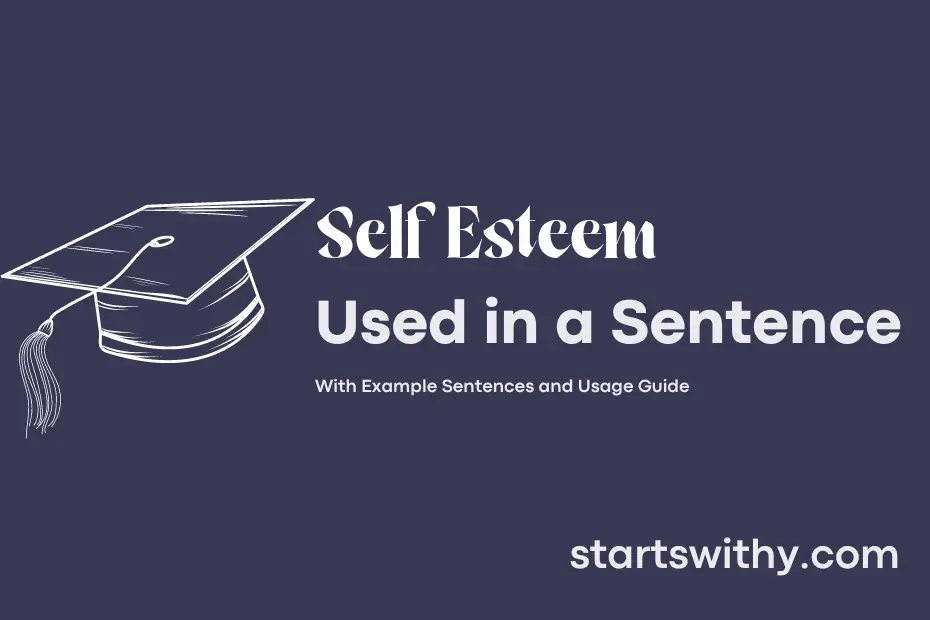Self-esteem refers to the overall belief in one’s own worth and abilities. It is a fundamental component of psychological well-being, influencing how individuals perceive themselves and navigate the world around them.
Having healthy self-esteem is crucial for fostering resilience, motivation, and positive relationships. On the contrary, low self-esteem can lead to feelings of inadequacy, self-doubt, and struggles with asserting boundaries. In this guide, we will explore ways to cultivate and maintain a positive sense of self-esteem, emphasizing the importance of self-compassion and self-awareness in enhancing one’s confidence and overall quality of life.
7 Examples Of Self Esteem Used In a Sentence For Kids
- Self esteem is about feeling good about yourself.
- We should always remember to have self esteem in everything we do.
- It’s important to believe in ourselves and have self esteem.
- We can boost our self esteem by trying new things and challenging ourselves.
- Everyone is unique and special, always remember to have self esteem.
- It’s okay to make mistakes, having self esteem means learning and growing from them.
- Let’s support each other and help build each other’s self esteem.
14 Sentences with Self Esteem Examples
- Self esteem plays a crucial role in a student’s ability to navigate the challenges of college life.
- It is important for college students to cultivate a healthy sense of self esteem to combat the pressures of academic performance.
- Taking time to engage in self-care activities can significantly boost a student’s self esteem.
- Peer support and validation can also contribute to a positive sense of self esteem among college students.
- Setting realistic goals and achieving them can enhance a student’s self esteem.
- Comparing oneself to others can often lead to a decrease in self esteem among college students.
- Seeking help from mental health professionals can be beneficial in addressing issues related to self esteem.
- Participating in extracurricular activities can provide opportunities for students to build their self esteem.
- Embracing failures and learning from them is essential in maintaining a healthy self esteem.
- Positive affirmations and self-reflection exercises can aid in boosting a student’s self esteem.
- Surrounding oneself with supportive and like-minded individuals can have a positive impact on self esteem.
- Seeking feedback and constructive criticism can help students improve their self esteem.
- Learning to accept and love oneself unconditionally is the foundation of a strong and resilient self esteem.
- Acknowledging one’s strengths and accomplishments can serve as a confidence booster for self esteem.
How To Use Self Esteem in Sentences?
Self Esteem is important for one’s overall well-being and success. When using the term in a sentence, remember to express confidence and self-worth. For example, you can say, “I have high self-esteem and believe in my abilities to achieve my goals.”
To correctly use self-esteem in a sentence, start by identifying the subject of the sentence, such as “I,” “She,” or “He.” Then, describe how that person feels about themselves using the term self-esteem. This can be positive, negative, or neutral depending on the context of the sentence.
Avoid using the term self-esteem in a way that diminishes someone’s confidence or self-worth. Instead, focus on uplifting and empowering statements that promote a healthy sense of self-esteem. This can help build a positive self-image and improve one’s overall mental and emotional well-being.
Remember that self-esteem is a reflection of how you perceive yourself and your value as a person. By using the term in a positive and affirming way, you can boost your confidence and create a more fulfilling life. Practice incorporating self-esteem into your daily vocabulary to cultivate a strong sense of self-worth and empowerment.
Conclusion
In conclusion, it is evident from the examples of sentences with self-esteem that one’s perception of oneself plays a significant role in shaping thoughts, behaviors, and interactions with others. Positive self-esteem, as demonstrated in sentences such as “I am confident in my abilities,” can enable individuals to pursue their goals with determination and resilience. Conversely, sentences reflecting low self-esteem, like “I am not good enough,” can hinder personal growth and cause self-doubt.
Ultimately, nurturing a healthy sense of self-esteem is crucial for overall well-being and success. By practicing self-compassion, self-care, and positive self-talk, individuals can cultivate a positive self-image and resilience to navigate life’s challenges with confidence and optimism. Embracing one’s worth and potential can lead to a fulfilling and empowered life.



